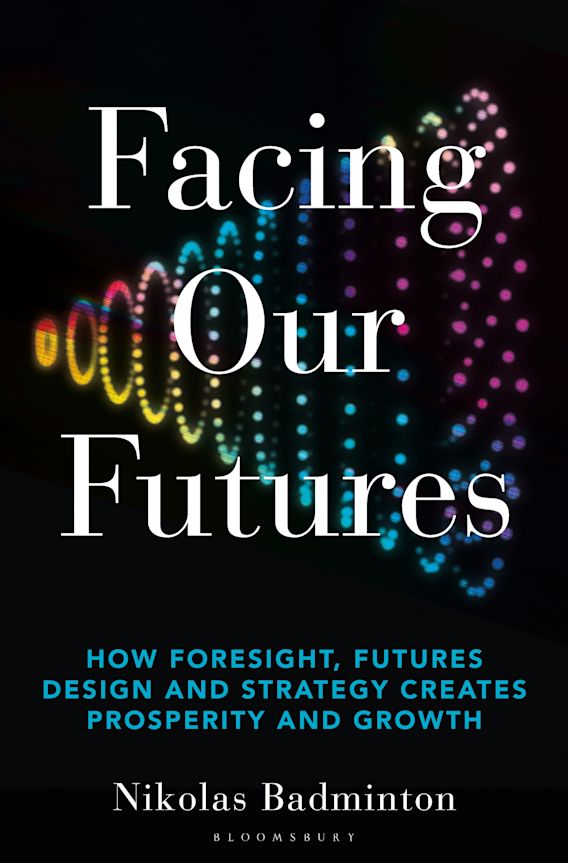Being occasionally invited to review business books for the HRDirector is a bit like entering a lottery. One is never sure of what one how good the book to be reviewed will be, what – if any – insights or epiphanies one will experience, or even whether the book answers a fundamental “So what?” Invariably, books for review are well-written, but few of them really advance a subject. However, I have rarely read a business book that has had a resounding and continuing effect. ‘Facing our Futures’ had the synapses of my brain crackling, my imagination fired up for both the best and worst of futures. And if that was in part the purpose of Nikolas Badminton, the author, then he succeeded. Big time.
The tone of the book is interesting and at the same time a little unsettling. It is both optimistic and pessimistic, simultaneously. It encourages great flights of imagination and creativity while at the same time asks you to keep your feet on the ground and be realistic. It’s both serious and contains humour. The author is very self-assured about his subject and is not afraid to say how good he believes he is at his chosen profession – he is a futurist – while also advocating strongly for humanity. And while the book demands a great deal of intellectual curiosity, it also has the capacity to affect one’s emotions.
Early in the book, the author provides his take of futurism and of being a futurist. Looking out into the longer term of 10, 20, 30 or more years is undeniably useful. But, it is also limiting, according to the way in which futurism in business is typically used. Futurism is usually used to predict the possibilities of the particular business or sector in which a company operates. It also demands that the role of technology is given a great deal of consideration of how it will be used to realise these possibilities. The people dimension, including the benefits to society, are relegated; people are more often than not a layer in the process, treated as a transactional element. Badminton questions this approach. Why should our futures be created for us by a small number of technocratic and super-rich elites in which everyone else is an agent to be exploited? Take the example of the internet, a tool which promises connectivity. What’s really being achieved is that our data is harvested by a few mega-tech companies for which people are rewarded with scant privacy and increasing levels of disconnection felt particularly among younger people.
Instead, the author encourages us to use foresight, which picks up on a variety of clues and signals that already exist and which point to various possible futures, some of which might be dystopian nightmares. Instead of limiting oneself to imaging the future of one’s business, there is opportunity to think of humanities needs and how business can serve these. And instead of 10-30 year horizons, think 50-100 or more years.
The possibility of dystopian futures doesn’t feature in futurism so much, and it features even less in the 3-10 year strategizing we are probably all familiar with. The intent in these processes is to imagine the positive only. The author challenges this as both limiting as well as short-termist. He wants us to confront dystopian futures. It’s the other side of the coin and by addressing our greatest fears we can identify what we do not want, and work towards those things that would prevent a dystopian outcome.
The author provides a variety of models which can be used to solicit the clues and signals needed in foresighting. The tools he suggests are not particularly sophisticated but it’s how the tools and the process is designed that are clever, just by being really quite simple. I would imagine that in any foresighting workshop the hard work is in firing up people’s imagination, generating the ideas and then subjecting them to the rigour of Badminton’s suggested process. But then I also imagine that Badminton has conducted enough of foresight workshops that he knows how to get the best out of them. I’m sure being a skilled facilitator is critical.
Would this book make you a skilled foresight facilitator? I’m not so sure. The author’s gift in this book is to ask you to step away from established norms of strategizing and imagining the future. It’s a skill he’s developed over years of experience. But would the book inspire you to think differently, want to seriously challenge the status quo? The book is definitely capable of that.
Moreover, the author wants us to prepare for our futures, not have them determined for us. That not only makes great sense for companies, it also speaks to sustainability and to a bright future for humanity.
Published by Bloomsburyhttps://www.bloomsbury.com/us/facing-our-futures-9781399400237/
Jim Kennedy, Founder and Director, Metis (People & Organisation) Consulting









